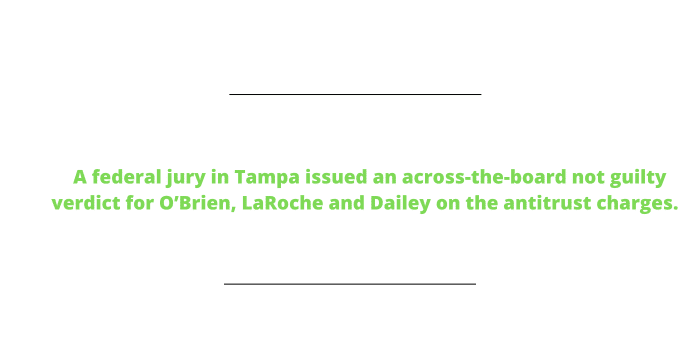A Florida jury has acquitted three men – Lawrence O’Brien, Bruce LaRoche and Thomas Dailey – of antitrust charges that had alleged they had colluded to rig bids for promotional products orders to the U.S. Army.
- The initial indictment came in April of 2022.
- It alleged that conspiratorial activity had occurred from about July 2014 to December 2019 and concerned millions of dollars in purchases of promotional products.
- If found guilty, the men would have been in violation of the Sherman Anti-Trust Act.
- The Florida jury determined that there was insufficient evidence to convict the men of rig-bidding.
The Indictment
In the most basic sense, rigging bids, as it applies to this situation, is the collusion of multiple parties to create a facade of market competition in an attempt to manipulate or fix a price.
- According to the indictment, LaRoche, Dailey and O’Brien exchanged their company’s bid templates and submitted bids to military customers on each other’s behalf in order to secure a pre-arranged winner.
- It also alleged that O’Brien defrauded the U.S. Army by using shell companies to pull off such a deception.
- The maximum penalty for violation of the Sherman Anti-Trust Act is 10 years in prison and up to $1 million in criminal fines.
In 2022, O’Brien motioned to have the case against him dismissed, but Susan C. Bucklew, a federal judge in the U.S. District Court for the Middle District of Florida, denied the motion in July 2022, claiming the indictment was “sufficiently specific to inform defendant of the charge against [O’Brien].”
O’Brien owns MP USA Marketing Group (PPAI 743974, D3), LaRoche’s owns Allegiance Tactical, and Dailey owns Quest Advertising.

The Verdict
A federal jury in Tampa issued an across-the-board not guilty verdict for O’Brien, LaRoche and Dailey on the antitrust charges.
- O’Brien was also found not guilty of charges of defrauding the government using shell companies.
Erik Matheney, who represented Dailey in the case, says that “I think the defense team as a whole did a very good job of showing that the evidence was lacking to prove our clients’ guilt.”
O’Brien’s attorney, Mark D. Wagoner, says that the accusations and indictment caused unnecessary stress and reputational harm to O’Brien.
“By the end, the jury realized that the prosecution’s case was built on such a shaky foundation of unsupported assumptions and unanswered questions that the case ultimately collapsed under its own weight.”


